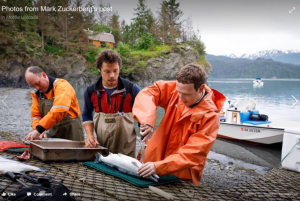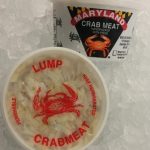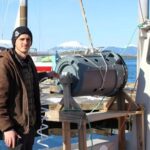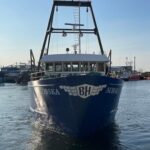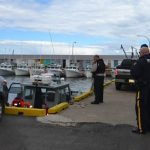Tag Archives: Gulf of Maine

Maine: Fishing industry forum May 24
Our way of life up and down the Maine coast is under attack. Families that have made their living in the lobster industry for generations are on the road to extinction. If the federal government has their way, pending regulations will force the lobster industry out of business and the Gulf of Maine will be reserved for offshore wind. The Lincoln County Republicans are hosting an event on May 24 where the public can hear, firsthand, from three prominent men in the Maine fishing industry – Representative Billy Bob Faulkingham, Dustin Delano and Jason Joyce. The event will be held at Coastal Christian School, 574 N. Nobleboro Road, Waldoboro. Doors open at 5:30 p.m. >click to read< 15:52
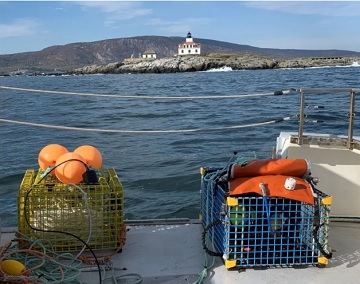
Hope vs. rope: Can technology save the whales, and Maine’s lobster industry, too?
Along the coasts of Massachusetts and Rhode Island, scientists, engineers, and fishermen are working feverishly to develop a new, high-tech way to harvest lobster – and the result could be the key to the survival of both the U.S. lobster fishery and the imperiled North Atlantic right whale. But farther north in Maine, the epicenter of the fishery, it’s unusually quiet. Only one Maine business is working on the technology, and only a handful of Maine lobstermen will test it. Many won’t even discuss it. The ropeless part is being worked out, but another critical component – an interoperable, open platform to track gear – is far from ready. The new equipment also is, at least for now, prohibitively expensive. One lobsterman said it would cost him nearly $500,000 upfront. >click to read< 16:20

U.S. identifies Gulf of Maine area for offshore wind development
President Joe Biden’s administration on Tuesday said it had finalized an area of nearly 10 million acres in the Gulf of Maine for potential offshore wind development, a major step toward expanding the industry into northern New England. The announcement was the latest milestone in the government’s plan to put wind turbines along every U.S. coastline to help displace fossil fuel for power generation and fight climate change. In a statement, the U.S. Bureau of Ocean Energy Management said it would kick off a 45-day period for public comment on the area, which sits off the coasts of Massachusetts, New Hampshire and Maine. >click to read< 08:25
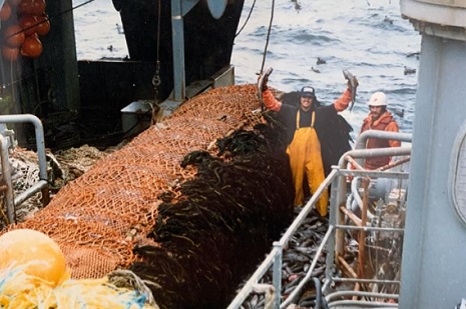
Who is Captain Sewall Maddocks?
Sewall’s love for the ocean first began when he was in grade school lobstering with his uncle Earl Brewer Sr. In 1977 he made his first trip on a trawler fishing with Richard McLellan on the F/V Sea Bring. He later became captain at 19 on the 82-foot F/V Irene’s Way, which was built for Richard at Goudy and Stevens in East Boothbay. In the early 80s, Sewall started to captain for F. J. O’Hara and Son’s out of Rockland, Maine He worked on the 110-foot F/V Alliance and later on the 119-foot F/V Araho, both stern trawlers, while fishing ground fish in the Gulf of Maine and on the northern edge of George’s Bank. Sewall later fished outside the 200 mile limit from Newfoundland on the tail of the Grand Banks. These boats typically had a crew of 5-6 people and caught 30,000-100,000 pounds of fish per trip with the fish being layered in ice in the fish hold. Great story! >click to read the rest< 10:22
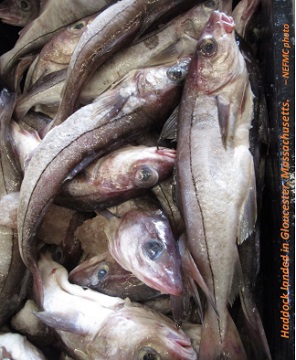
NEFMC Requests Emergency Action for Gulf of Maine Haddock to Prevent Significant Fishery Impacts
The New England Fishery Management Council is asking NOAA Fisheries to take emergency action under the Secretary of Commerce’s authority to address a critical Gulf of Maine haddock situation that is expected to result in significant fishery impacts during the 2023 groundfish fishing year. The crux of the problem is this. Fishermen have been encountering Gulf of Maine haddock at very high catch rates. The proposed 2023 annual catch limit (ACL), however, is extremely low. The Council recently learned of one industry member who, in a single trip, harvested an amount of Gulf of Maine haddock equivalent to what will become his entire allocation for 2023. Several fishermen expressed concern that an early shutdown of the fishery was highly likely and would have wide-ranging impacts. >click to read< 15:43
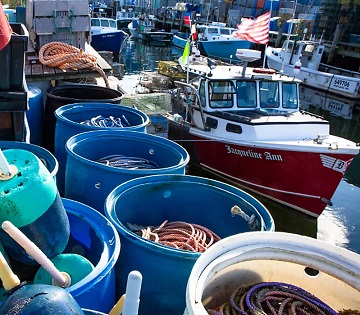
Maine’s seafood harvest has fallen 120M pounds since 2012
At 197 million pounds for all commercially harvested marine species, 2022 was the first time since 1975 that Maine’s reported annual seafood harvest has fallen short of 200 million pounds. In fact, the cumulative volume of Maine’s commercial fisheries dropped by more than 120 million pounds between 2012 and 2022, state data show. Patrick Keliher, head of the state’s Department of Marine Resources, said there are myriad reasons why fishery landings have declined — some regulatory, others environmental. Meanwhile, landings of lobster, which remains the state’s dominant fishery despite looming restrictions to better protect whales, have dipped in recent years but still are much higher than they were prior to the 1990s. >click to read< 09:12
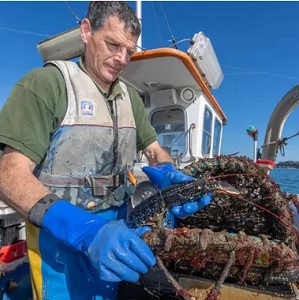
Not for the pot: how ‘V-notching’ lobsters may help save them
Cornishman Ned Bailey has caught and returned ‘notched’ lobsters for years as part of a broader effort to preserve stocks. But many fishers do not. He tosses out stray crabs, several starfish and a squirming conger eel. Every so often he pulls out a lobster: if the carapace is over 90mm (3.5in) long, he keeps it; if not, it’s thrown back into the sea, in line with regulations. But today, one lobster, the underside of its tail bursting with clusters of inky-black eggs, is kept aside. This is a berried hen, a pregnant female, carrying about 20,000 eggs. Bailey cuts a small “V” into its dappled royal-blue and yellow tail before gently laying the lobster back in the water. Now she is marked as illegal for others to land – and with any luck her reproductive potential is secured for a few more years. >click to read< 09:39
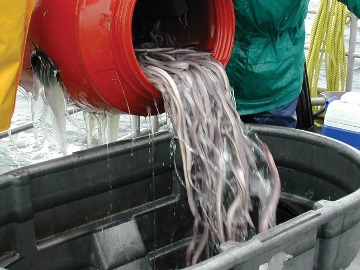
Meet the Hagfish, the Slime-Spewing Star of Maine’s Nastiest Little Fishery
The first time Vinalhaven lobsterboat captain Frank Thompson trapped hagfish in the Gulf of Maine, the pinkish-gray, snakelike animals popped the hatch off his hold — with their slime. When stressed or attacked, a single 20-inch-long hagfish spews a quart of stringy, suffocating snot in less than a second, and the stuff rapidly expands as it mixes with seawater. It was May 2009, and Thompson’s 48-foot boat was carrying 2,800 pounds of hagfish — that’s roughly 5,000 fish oozing copious slime from their skins. Unable to escape their own goop, many of the fish were dead when Thompson unloaded his catch in Gloucester, Massachusetts. >click to read< 17:24
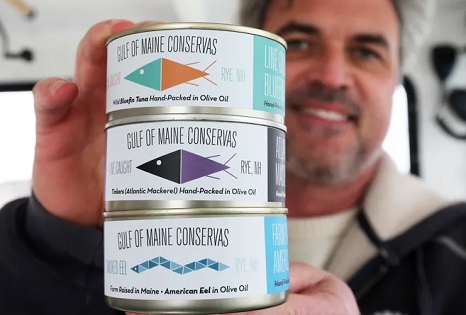
Rye, N.H. fisherman Keper Connell hooks consumer wave with his Gulf of Maine tinned tuna
Each tin of Gulf of Maine Conservas tuna begins with fisherman Keper Connell boarding Figment, his 45-foot Novi, long before sunrise to make the two-hour, 25 mile journey from Rye Harbor in New Hampshire to Jeffreys Ledge. Connell doesn’t catch tuna on every trip to the ledge, but when a giant bluefin does strike his line, he 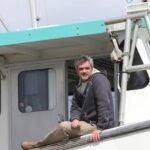 still gets a rush of adrenaline. In 2019, he began experimenting with canning some of his catch, getting the right blend of fresh fish, Calivirgin olive oil and salt. He contracted with a cannery in Oregon and launched his business, Gulf of Maine Conservas. “I’m catching the fish, I’m portioning it, I’m cooking it and then I’m containing it,” he said. “All you as the consumer have to do is open it and enjoy it.” >click to read< 16:34
still gets a rush of adrenaline. In 2019, he began experimenting with canning some of his catch, getting the right blend of fresh fish, Calivirgin olive oil and salt. He contracted with a cannery in Oregon and launched his business, Gulf of Maine Conservas. “I’m catching the fish, I’m portioning it, I’m cooking it and then I’m containing it,” he said. “All you as the consumer have to do is open it and enjoy it.” >click to read< 16:34
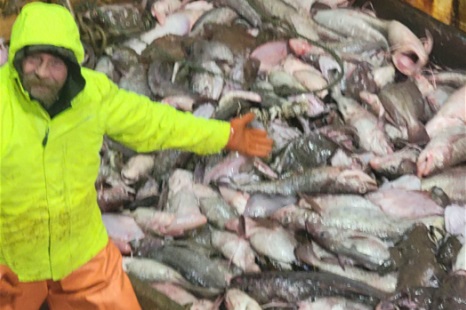
When things don’t add up. By Jerry Leeman
Sitting here towing along thinking back 20 years ago fishing in the Gulf of Maine. We used to land a lot of white hake. An average trip was always around 15k to 30k of hake 5k of monk tails on average. These days you worry of catching too many and you try to stay within the realm of your allowable catch because fish cost money to catch. Yes, even as crazy as that sounds boat quotas have been restricted from bad data collection to be so low, we have to purchase quota from other permits to maintain fishing. Then with these restrictions it puts a damper on markets. Imagine, markets that used to take in 200-500k of one specie a week then no longer are capable of taking in those fish because markets are not strong due to poor biomass data and allowable catches which have altered markets. >click to continue reading< 16:28
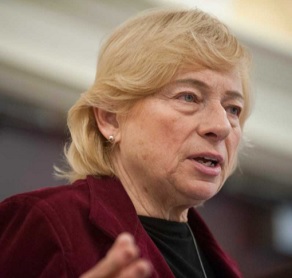
Many voices weigh in on offshore wind plan
Three days after Governor Janet Mills unveiled an offshore wind roadmap, a “comprehensive plan that offers detailed strategies” for offshore wind power in the Gulf of Maine, a handful of unconvinced citizens gathered at the Sustainable Maine Fishing Foundation Feb. 26 on Bar Harbor Road in Trenton. The idea was to inform lobstermen and interested people on offshore wind development before a Bureau of Ocean Energy Management (BOEM) presentation that opens the Fishermen’s Forum March 2 in Rockport, board member Ginny Olsen said. Energy operations consultant George Stover of Freeport, who has worked in the state’s energy industry for decades, discussed the Maine power grid and its energy sources and why, to his mind, offshore wind power is not a good fit or needed here. “If they continue down this road, it scares me,” he said. He is not alone. The idea of floating offshore wind installations in the Gulf of Maine has raised fears and concerns from environmentalists and fishermen alike. >click to read< 12:42
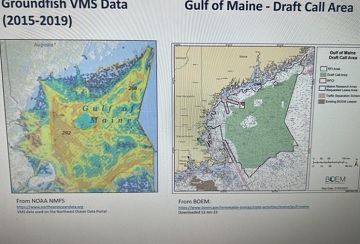
Gloucester webinar tackles concerns about wind farm projects
At the nascent stage of wind farm development in the Gulf of Maine, a webinar last week looked at the possible impacts to marine life, coastal communities and fisheries while acknowledging there are many unknowns to such projects. Capt. Al Cottone, a commercial fisherman and executive director of the Gloucester Fisheries Commission, said the industry has “a ton of questions that haven’t been answered yet. And I don’t think these questions will be answered in the time frame that was shown earlier in the presentation and it’s very concerning to the industry.” “We are very concerned about the displacement of vessels,” Cottone said. “Once you start losing access to fishing grounds, it puts a lot of pressure on other fishing grounds.” >click to read< 12:28
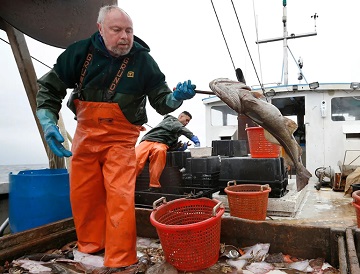
Are cod ‘severely depleted’ in the Gulf of Maine? Fishermen, scientists view ocean depths differently
When fishermen and women look at the gray Atlantic waters off New England, they see a marine environment literally swimming with cod, the popular white fish prized around the world for its mild flavor. Scientists, on the other hand, say Atlantic cod stocks in the Gulf of Maine are severely depleted and possibly vulnerable to extinction. The question of how fishermen and marine scientists employed by government agencies can view cod numbers so differently has puzzled Micah Dean, a marine biologist with the state of Massachusetts, for years. While a doctoral student at Northeastern University, Dean believed he came up with an answer. >click to read< 19:00
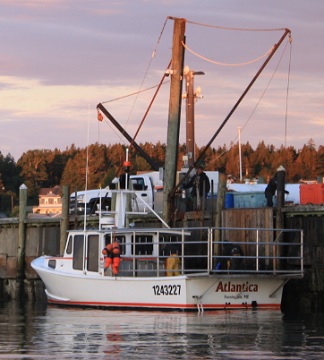
Maine wants to transform how the US manages the lobster fishery.
Patrick Keliher, Maine’s Department of Marine Resources commissioner, has argued that the fishery needs more “tools in the toolbox.” Now, with the most time he’s had in recent memory to sit down and craft new measures, he is hoping that the dawn of “dynamic management” in Maine is here. What is dynamic management? In theory, it’s a simple strategy to keep fishermen fishing, while also making way for whales. The Gulf of Maine would be monitored, with listening devices in the water and planes in the sky, for right whales. If signs of right whales are detected, fishermen would have to clear their traps out of the area. Dynamic management has been pitched by Maine before, and a version of it is being used in parts of the Canadian snow crab fishery. >click to read< 14:35
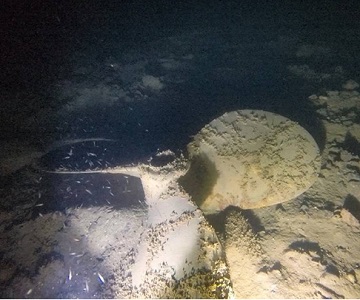
Baffling find made on seafloor 100 miles off Maine, NOAA says. ‘What are the odds?’
Scientists often find oddities on the seafloor, but NOAA researchers were baffled when a camera dropped off Maine landed on top of a large propeller 100 miles from shore. No shipwreck, mind you. Just the propeller “lying among the rocks, sea stars, and sea anemones.” The mystifying discovery was made in the Gulf of Maine, as the fishing vessel Mary Elizabeth was participating in a NOAA Fisheries seafloor survey. The intact propeller was 3 feet across, which means the vessel was at least 50 to 60 feet long, he said. That’s the same length as the Mary Elizabeth, Captain Phil Lynch noted. photos, >click to read< 13:26

In Hot Water
So, let’s run a logical thought based on what our governments assumption is on fish stocks with what we know. NOAA says there is nothing wrong with the biomass of white hake, but they cannot find adolescent hake. Ask a lobsterman along the shoreline. They are seeing an abundance of juvenile hake and cod in their traps. Imagine lobstermen and inshore fishermen across a vast area all saying the same thing? NOAA says there’s nothing wrong with the biomass of haddock but same thing, they can’t find small fish. But what do we know?! >click to continue reading< By Jerry Leeman 20:30
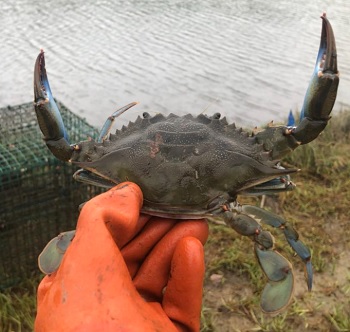
Surprising Blue Crab Population Develops In Maine
Up in the Gulf of Maine, outside the crabs’ historic range, these creatures are a source of surprise. But over the past few years, it has become more and more common for people to find blue crabs. Lobster fishermen and women are catching them in their lobster pots. Divers are seeing them when they search for scallops. Beachgoers are spotting them in tide pools. “We don’t want to make claims yet that this is a permanent population,” Crane said. “If we’re finding blue crabs for five or ten years in the same locations, that starts to be a more compelling argument that this is a permanent population.” >click to read< 15:24
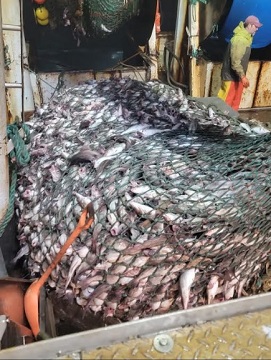
Jerry Leeman: So, let’s plug in what we know.
So, let’s run a logical thought, based on what our governments assumption on fish stocks is, with what we know. NOAA says there is nothing wrong with the biomass of white hake, but they cannot find adolescent hake. Well ask any lobstermen along the shorelines, they are seeing abundance of juvenile hake and cod in their traps. Imagine Lobstermen and inshore fishermen across a vast area all saying the same thing? NOAA says there’s nothing wrong with the biomass of haddock but same thing, they can’t find small fish. Well, what do we know?!! >click to continue reading< 08:33

Maine Republicans want to end tax breaks over lobster bans
Legislation expected to be filed by the GOP minority for consideration in the next session would prevent Whole Foods, or other groups that ban lobster sales from getting tax breaks available to Maine businesses. Last week, Whole Foods announced plans to stop selling lobster caught in the Gulf of Maine at hundreds of its retail stores across the country. During the Tuesday briefing on the proposal, Republican lawmakers framed the issue as one of survival for the state’s storied lobster industry, which they say is struggling amid labor costs, foreign competition and costly federal regulations aimed at preventing whales from becoming entangled in fishing gear. >click to read< 14:54
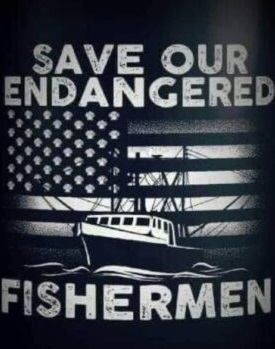
All for one and one for all – With Jerry Leeman
Well, if NOAA goes through with these cuts this coming year to groundfish stocks I’m afraid there won’t be a fishing season next year. They have created choke species thru faulty assessments. I don’t know why I say assessments because they really haven’t done enough to make any logical cuts to any stock. To my family and friends who are lobstermen. You will watch the bait prices double overnight once the last groundfish boat is done. No more bait will be landed thru the groundfish efforts. That’s right no redfish racks, no hard bait and no skates. This will happen. I’ll do my best to argue everyone’s circumstances and the errors of their data and sampling methods using on the job experience offshore for 14 years at sea in the last 21 years. The entire groundfish fleet Captains are united in this argument that the data is corrupt and wrong in many ways. All offshore fishermen spend more time trying to avoid fish due to the made-up choke species brought to us by bad science and lack of know how. >click to continue reading<, 15:03
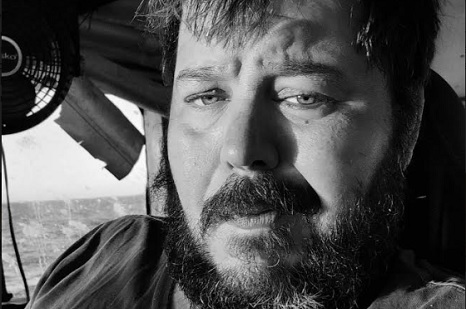
So, let’s talk about why the assessment surveys by NOAA research vessel data is corrupt.
So, let’s talk about why the assessment surveys by NOAA research vessel data is corrupt. The research vessel only makes computer generated tows randomly prints the tow log for the assessments to take place. The research vessel goes to those designated sights and makes 20-minute tows then on to the next tow. The fall survey lasted 66 days from start to finish. They were supposed to make 377 tows at 20 minutes a piece the vessel started in Virginia and tow logs were to be made all the way to the Gulf of Maine. Only 308 tows were made in this 66-day assessment. 308 tows were accomplished of the 377 supposed to be towed so only 82% of the survey was completed. If you look at the tow areas, only 30 tows were made in the Gulf of Maine. >click to read<, By Jerry Leeman

Walton: Maine lobsters — a coast to coast dispute
Some years back I wrote about my distaste for seafood. If it swims in our oceans or lakes, I don’t eat it. To my surprise, many readers acknowledged they feel the same. So perhaps they are as shocked as I am that I rise to the defense of the Maine lobster industry, which finds itself on a prominent and respected environmental “watch” list, threatening thousands of jobs up and down the Maine coast. Why should a guy who prefers a good burger care? >click to read< 08:19

Are we really going to let them kill our ocean and our fishing way of life?
Generations of fishermen are no longer fishing because of the restrictions and unfair quota from faulty science. Like I said in earlier posts, we went from 400 active boats down to 17 barely active boats. Meanwhile conservation groups will tell you that we are wiping the ocean out from overfishing. That is so wrong on so many levels, it isn’t even funny. Hard to believe New England was considered to be sustainable for haddock and lobsters. Then fishing efforts went down and now we are no longer sustainable. The only thing that’s changed is windmills are on their way to the Gulf of Maine and the management at NOAA and NMFS are allowing it to happen. Why would they not talk to the people who have committed their lives to the job of harvesting our ocean?! Well, I can’t speak for everyone, but I have a few hypotheses. By Jerry Leeman. >click to read< 16:38

Maine lobsterman blasts Whole Foods over lobster ban
A Maine fisherman slammed Whole Foods’ decision to stop selling Maine lobsters in its stores on Monday, calling on the grocery chain executives to do their “homework” before writing off the livelihoods of hundreds of lobstermen. In an appearance on “Jesse Watters Primetime” Monday, Maine lobsterman Jason Lorde denounced the decision, arguing that no right whale has died due to Maine lobster gear and that the fishing community in the state has long complied with laws and regulations to protect right whales. “I think Whole Foods maybe should have done a little more homework,” Lorde said. “We have been in business for over 150 years, and we have done our due diligence. We were conservationists before conservationists was cool. I’m sorry they felt they had to jump on the bandwagon with all the rest of the West Coasters.” Video, >click to read< 10:22
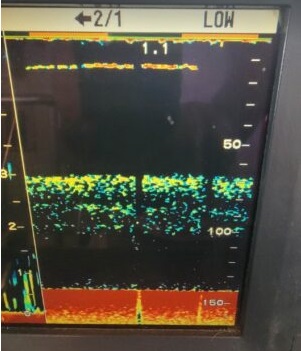
Jerry Leeman – Why it is wrong to assume anything
I’ll use this photo to prove a point. NOAA uses a computer to pick where their assessments on fish stocks will take place. Here lies the problem. It’s in random spots, and they never make the same tow again at the same time of the year because they use a computer model that knows nothing of fishing. NOAA is taking the assumption that fish live everywhere. That’s pretty funny because if you knew anything about fishing at all, fish species don’t hang on every piece of bottom all day and night. They just don’t. Not only do fish have tails, but they also swim up into the water columns and travel with the feed and breeding cycles and changes of the seasons. >click to read the rest< by Jerry Leeman.16:16
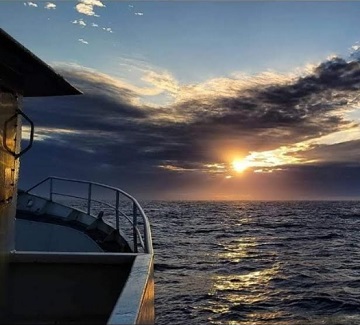
Jerry Leeman: Fishing is my life. Somewhere, people forgot to listen to the generations before us.
I’ve spent all my life on the ocean. My family and friends are fishermen and lobstermen. I grew up on an island in Maine and almost everyone was in some form of fishery, whether it be groundfishing, gill netting, seining and lobstering. We even had shrimping till that was mis managed away. I grew up watching these men and women harvesting the ocean. Rules were put into place to harvest the ocean responsibly and sustainably for future generations. Most people in this nation know little to as of why our fish stocks became depleted. Other nations like Russia and other European super trawlers were allowed to pillage our waters along the New England coast. They were eventually banned, but the destruction had been done. We’ve spent years restricting ourselves fishing, going out of our way bending backwards to rebuild our fish stocks. >click to read< By Jerry Leeman 11:19

Well, the windmill agenda is damning us all. Fisherman Jerry Leeman
Well, the windmill agenda is damning us all. The evidence all points in the same direction from the standpoint of the sea. I’m a fisherman and have been all my life here in New England. I was raised on an island in Maine with a bunch of fishermen and fishing families. Everyone has their own style and way of harvesting the ocean. The unspoken truth is we all are for the betterment of the ocean, stewards of the sea by trade. That’s why we have management teams or supposed to which manage the stocks which the government and state control and not the actual harvesters. Here in New England, we are the most regulated fishermen in the world and that’s no lie. We have video tracking daily reporting and 100 % observer coverage. Your every move is being watched. All the fishermen are now switching their efforts and styles of groundfishing to fish without fishing is my best way to describe it. >click to read< 22:34
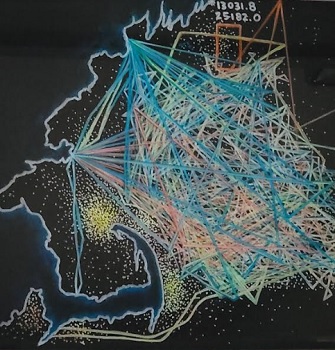
What’s wrong with the management?!! By Jerry Leeman
So, I’m using this piece of artwork, because I’m not driving 3 states away to pull up all my tracks. This is only a piece of artwork depicting a small percentage of the ground I’ve covered in the Gulf of Maine and George’s Bank. We all talk about the best science, while the best science is done when you have the best observations. That is the whole basis of science is study thru observations. How come a man like me who has over 14 years documented at sea in 21 years not have a voice in the management of our nation’s fishery? No one has ever asked me what I am seeing. They just hand me a piece of paper every time there’s a rule change. Then I figure out how I’m going to manage what little abundance they allot me. Please click to read the rest. >click to read< 15:07
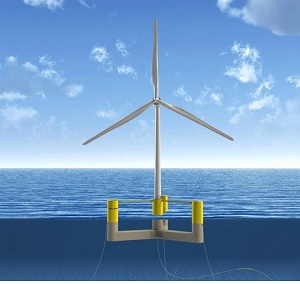
Say no to blood money
New England Aqua Ventus, a joint venture between Diamond Offshore Wind, a subsidiary of the Mitsubishi Corporation, and RWE Renewables, the second largest company in offshore wind globally, was formed to develop UMaine’s floating offshore wind technology demonstration project. The Biden administration is dumping trillions of taxpayer dollars into offshore wind initiatives and offshore wind companies are big donors to environmental causes which was, without a doubt, one reason for Bigelow’s decision to grant this easement to NEAV. Eliminating our lobster industry clears the way for a Gulf of Maine filled with windmills. These global companies are financially supporting the environmental groups that are driving the North Atlantic Right Whale risk reduction measures aimed at eliminating Maine’s lobster industry. >click to read< By Patty Minerich 08:27

Save our way of life
In case you haven’t been paying attention, hundreds of billions of dollars are being spent at the federal and state level on offshore wind development. The Biden and Mills administration is 100% committed to reimagining our historical marine economy into a new “green” economy made up of aquaculture and offshore wind power generation. If you don’t believe me, flip through the federal Inflation Reduction Act (what an excellent oxymoron) and Biden’s 2021 Infrastructure Investment and Jobs Act. Make no mistake, eliminating the lobstering industry through the Right Whale risk reduction regulations paves the way for offshore wind development >click to read< By Patty Minerich, Boothbay Harbor 17:33

































